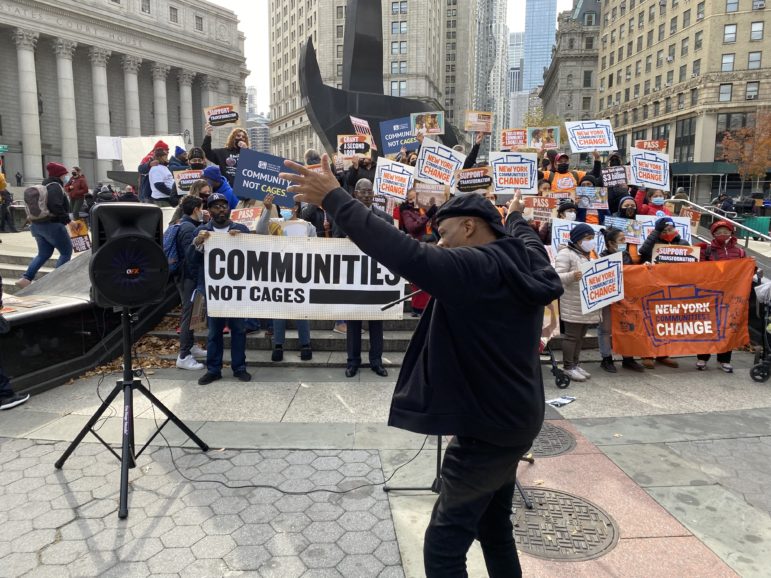The new “Communities Not Cages” coalition is pushing for passage of three new bills that would eliminate mandatory minimum prison sentences in the state and offer incarcerated New Yorkers more opportunities to have their sentences revisited and shortened.

Courtesy Center for Community Alternatives
Members of the “Communities Not Cages” coalition rallied in Lower Manhattan on Wednesday.More than 30 years ago, in 1990, the average length of time someone spent in New York State’s prisons was 27.9 months, or a little over two years. In 2019, that average had nearly doubled, to approximately four and half years behind bars—the result, criminal justice advocates say, of harsh “tough on crime” policies passed in the 1970s through 1990s that disproportionately locked up New Yorkers of color.
On Wednesday, dozens of advocacy groups, lawmakers and formerly incarcerated residents launched a new campaign aimed at reforming the state’s sentencing laws. The “Communities Not Cages” coalition is specifically championing the passage of three bills in the upcoming legislative session in Albany that would would eliminate mandatory minimum sentences, and offer New Yorkers being held in the state’s prisons—of which there were 31,555 as of Nov. 1—more opportunities to have their sentences revisited and shortened.
“This era in New York has seen a regime of sentencing that has funneled hundreds of thousands of people into cages,” said Marvin Mayfield, an organizer with the Center for Community Alternatives, during a rally in Manhattan’s Foley Square on Wednesday. He and other campaign members called the state’s sentencing policies “racist and draconian,” pointing to the fact that nearly 75 percent of those being held in state prisons are people of color.
“This was not an accident. This pattern of racism and discrimination can be traced back to its roots in slavery,” Mayfield said.
The group is setting its sights on the upcoming legislative session that will kick off in Albany in January, pushing for the passage of three soon-to-be introduced bills: The first, to be sponsored by State Sen. Zellnor Myrie, would eliminate the state’s mandatory minimum sentences, what advocates say is a lingering impact from the state’s Rockefeller Drug Laws passed in the 1970s and give prosecutors leverage to extract plea deals from defendants and avoid going to trial.
Nearly all misdemeanor convictions (98 percent) and felony convictions (94 percent) in the state are obtained via guilty pleas, according to a report from the New York State Association of Criminal Defense Lawyers. These pleas are obtained, advocates, by the threat of potential lengthy prison sentences that could be imposed under mandatory minimums.
“Prosecutors use the threats of these outrageous mandatory minimums to skirt due process and extract guilty pleas,” Mayfield said during Wednesday’s rally. Myrie’s bill would also eliminate New York’s two- and three- strike laws—which mandate certain sentences if a defendant has prior convictions—shifting more discretion to judges in deciding prison terms.
The two other bills the campaign is targeting would allow New Yorkers already sentenced to prison time more opportunities to have their sentences revisited and potentially shortened. New York is home to nearly 9,000 people serving life sentences—the third largest population in the nation—and more than 10 percent of those being held have been there for more than 15 years, the campaign says, leading to a crisis of New Yorkers aging behind bars.
The Second Look Act, to be sponsored by Brooklyn State Sen. Julia Salazar, would allow judges to review and potentially amend sentences after they’ve been imposed. Under the law, incarcerated people would be granted the right to request a sentencing hearing after serving 10 years behind bars.
The third bill, the Earned Time Act, from Assemblymember Anna Kelles and Sen. Jeremy Cooney, would increase opportunities for incarcerated people to earn “good time” and “merit time” and potentially shave time off their sentences by participating in rehabilitative programs, like education and employment training—programming that advocates say was slashed significantly during the 1990s, despite evidence that they help better prepare people for transitioning out of prison and reduce recidivism rates.
The trio of bills could likely face backlash from Republican state lawmakers, similar to the 2019 bills passed to overhaul the state’s bail system, which aimed to greatly restrict the use of cash bail and pretrial detention for nearly all misdemeanor and nonviolent felony charges. Those changes led to a reduction in jail populations across the state, but were partially rolled back in 2020 just months after implementation after critics charged they posed a threat to public safety (something supporters assert is false).
Supporters of overhauling New York’s sentencing laws say the money the state spends on incarcerating people for long periods—at the cost of nearly $70,000 a year per person behind bars—could be better spent on rehabilitation and programs to help address the root causes of crime via healthcare, housing and education.
“This is our moment—we cannot shrink back when people attack us, when people say there has been too much reform,” Myrie said at Wednesday’s rally.
“As if public safety doesn’t apply to ripping our families apart for years,” he added. More than 105,000 kids across the state have a parent serving time in a New York jail or prison, campaign organizers say. “It is our communities that are being thrown in these cages.”









2 thoughts on “New Campaign Aims to Reform NY’s ‘Racist, Draconian’ Sentencing Laws”
You are defending vicious animals killing women and children of color throughout the city. What will you do when these vucious animals break into your families homes committing these vicious crimes? Would you still want no more police? Stop the insanity! We need New Jails. The Death Penalty. Hang em them all for what they reap they should sow.
Bravo. Bravo. Bravo. Standing Ovation.